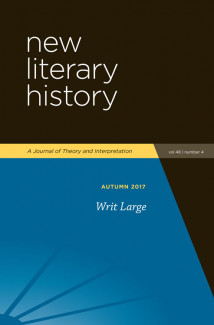
Johns Hopkins UniversityEst. 1876
America’s First Research University
Large and in Charge

The final issue of New Literary History's 48th volume took on a big issue. Literally. University of Virgina professors Krishan Kumar and Herbert F. Tucker guest edited the special issue "Writ Large", which featured eight essays on big thinking and big writing. Tucker joined us for a Q&A about this special issue that tries to answer the age-old question of "is bigger better?"
How did this special issue come about?

How important was it for NLH to examine this topic across multiple disciplines?
It’s perennially important that NLH special issues draw on the perspectives of several disciplines. What cardinally mattered to us in this instance was to demonstrate alike the breadth of our topic for humanities and social sciences, the depth of its precedents since early modernity, and the length of its reach into emergent areas of inquiry, including their methods and the ethical and political matters these entrain. So a reader of the "Writ Large" issue will find food for thought not just about Big History but as well about Big Geography, Big Sociopolitics, Big Media, Big Data.
Did the past move toward "small" thinking come from individuals thinking they needed their own area of expertise to stand out or was it just a natural progression of research?
We take this up in our editorial introduction, as do our first couple of contributors. There’s a well-known tendency in academic research towards disciplinary refinement: a good thing, no doubt, as regards methodological precision; but an equivocal one as it narrows toward the microscopy that has cohorts of scholars individually knowing more and more about less and less. As you can tell, that strikes us as “progression” only in a technical sense that comes with the dependencies of disciplinarity itself. It’s because disciplines, left to their own introversive devices, find it hard to appreciate how such progression may impede real progress that an interdisciplinary approach is needed from time to time. One irony that pervades our topic is that scholars’ scrupulously bracketed expertise so often takes for granted some big-picture idea or narrative that they have been trained to disregard, if not to disdain.
Where did the title come from?
Reckless hope that something quaint about an elderly phrase might pique interest in a decidedly contemporary development. Several colleagues on the editorial staff wanted it just called “Big.” And that was our working in-house title for the project over many months of bringing it to fruition. Should we have used it instead?


